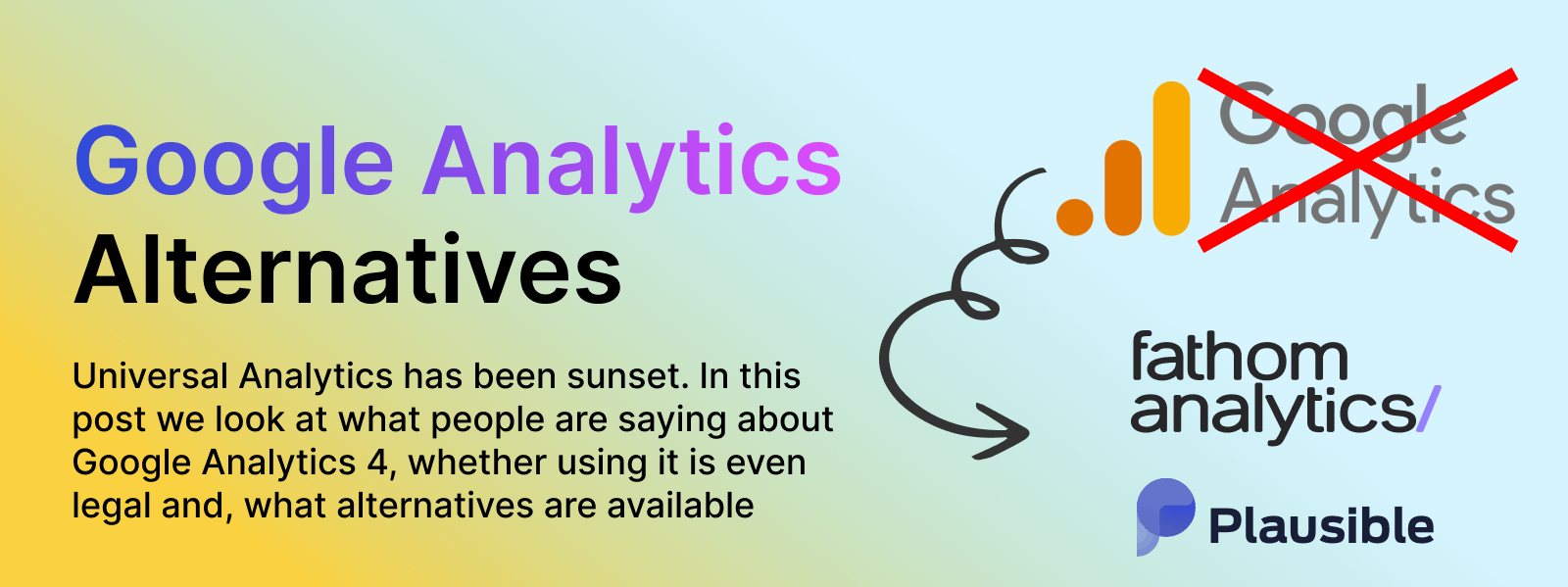Updated 24/07/2023
We've just passed an important milestone in the world of analytics: the sunset of Universal Analytics (UA). In this post we'll look at why users liked Universal Analytics, what people are saying about Google Analytics 4 (GA4) and whether using it is even legal and, what alternatives exist.
Why did businesses love Universal Analytics
It's fair to say Googles UA offering was the first tool many reached for when looking to gather analytics for their sites. Its shutdown marks the end of an era for a platform that has long been a staple for businesses, organisations, and websites seeking to understand user behaviour and derive insights. This was for a number of reasons:
- Flexibility - Extensive customisation options allowed for easy tailoring of specific dimensions and metrics, enabling deeper insights and more accurate analysis.
- Comprehensive Data Tracking - It provided a robust framework for tracking data across multiple platforms and devices, giving businesses a holistic view of user interactions, including website visits, conversions, events, and e-commerce transactions at a granular level.
- Integration with Google - A seamless integration with Google Ads, Google Tag Manager and Google Data Studio. This made it easier for businesses to combine data from multiple sources and gain a comprehensive understanding of their marketing efforts and user journeys.
- Price - Free to use, attractive to all businesses.
These are just some of the many reasons that led to UA becoming the go-to analytics platform for businesses.
Yet, despite that, it has come under fire in recent years for not complying adequately with data protection laws. With it's sunset and the current regulatory environment, surely the introduction of GA4 was ripe for solving this issue?
Google Analytics 4 - A replacement that doesn't solve the legality issue?
So now that GA4 has arrived in full, how does it compare to UA at a high level? A few highlights:
- Measurements - GA4 introduces a new event-based tracking approach, allowing for more flexibility and detailed event tracking across platforms. UA used a hit-based tracking model, where data is collected and organized into hits, such as pageviews, events, or transactions.
- Data Collection - IP addresses no longer collected, shorter user data retention periods and simplified data deletion. This brings it closer to falling in line with GDPR.
- Analysis and Reports - Provided templates make it easier to build custom reports and funnels. Machine learning insights provide predictive metrics for planning.
Despite the improvements the reception to GA4 has been mixed, with many users describing the interface as messy and struggling to get to grips with it.
Is it even legal?
UA was not legal under either GDPR or with the Privacy Shield, and fines have begun to be levied against companies that used Google Analytics in the EU (see this Noyb article).
With the introduction of Privacy Shield 2.0 on 10th July 2023 (more info here), the usage of GA4 is now in theory compliant with regulations, but there are already plans to challenge this in the EU Court Of Justice (CJEU). The key provisions which allowed Privacy Shield 2.0 to enter usage are ambiguous, and could be overturned.
If you intend to stick with GA4, be aware of the risks, and have a plan to migrate to another service in place if the worst happens.
A Challenger Approaches
So if GA4 is potentially going to fall foul of regulations that mean it's not legal to use in the EU, what options do you have for analytics if you need to service a global customer base?
Over the last few years, several alternatives have sprung up that focus on preserving user privacy whilst providing quality analytics. Today we'll take a look at a couple of popular options.
Fathom Analytics
Fathom sprung out of a desire to provide a better alternative to the big tech services that offered free analytics but monetised the data collected. Well known in the industry, the last few years have seen them go from strength to strength with big companies such as GitHub, Transistor and Buffer amongst their client base.
With a focus on user privacy to ensure regulatory compliance they go to pains to provide a fast, user friendly GA alternative. They even have an importer to make getting your historical data from GA a breeze.
With extra bells and whistles such as real time data in the dashboards, 100% data retention, no sampling to estimate data and, support from actual humans (including the founders), Fathom offers a lot to like.
Plausible
Plausible is dedicated to making the web more privacy friendly. They offer an analytics service that is focused on simplicity whilst preserving user privacy. Used by customers like Basecamp, Plausible is also rare in that it provides an open source version, for users to self host if they wish.
With a simple, user friendly dashboard, an extremely lightweight tracking script, a GA importer for historical data and integration with the Search Console, Plausible provides a great alternative to GA.
Swetrix
Swetrix focuses on user privacy and transparency, while at the same time offering the same functionality as competitors like Google Analytics. With simplicity and transparency a priority, Swetrix not only features their cloud-hosted offering, but also provide an open source self hosted version.
Even though it starts at the most affordable price point in this list, it offers extra features like user flow analysis and performance monitoring out of the box. With a marketplace of extensions and an API for retrieving aggregated data programatically, Swetrix has a few aces up its sleeve for those looking for a greater degree of customisation.
Wrapping Up: What are the options?
So what does this all mean? Well, if you're happy to take the risk that GA4 will stay compliant with regulation, then you can stay with them. Though we would encourage you to have a plan in place, just in case.
If your users privacy is important to you, you'd rather avoid the headache entirely, or maybe even if you just want a more user friendly option, then consider giving Fathom Analytics, Plausible or Swetrix a try.
And if you're looking for GDPR compliant personalisation, PureClarity can help, so why not book a demo, or even sign up today.




